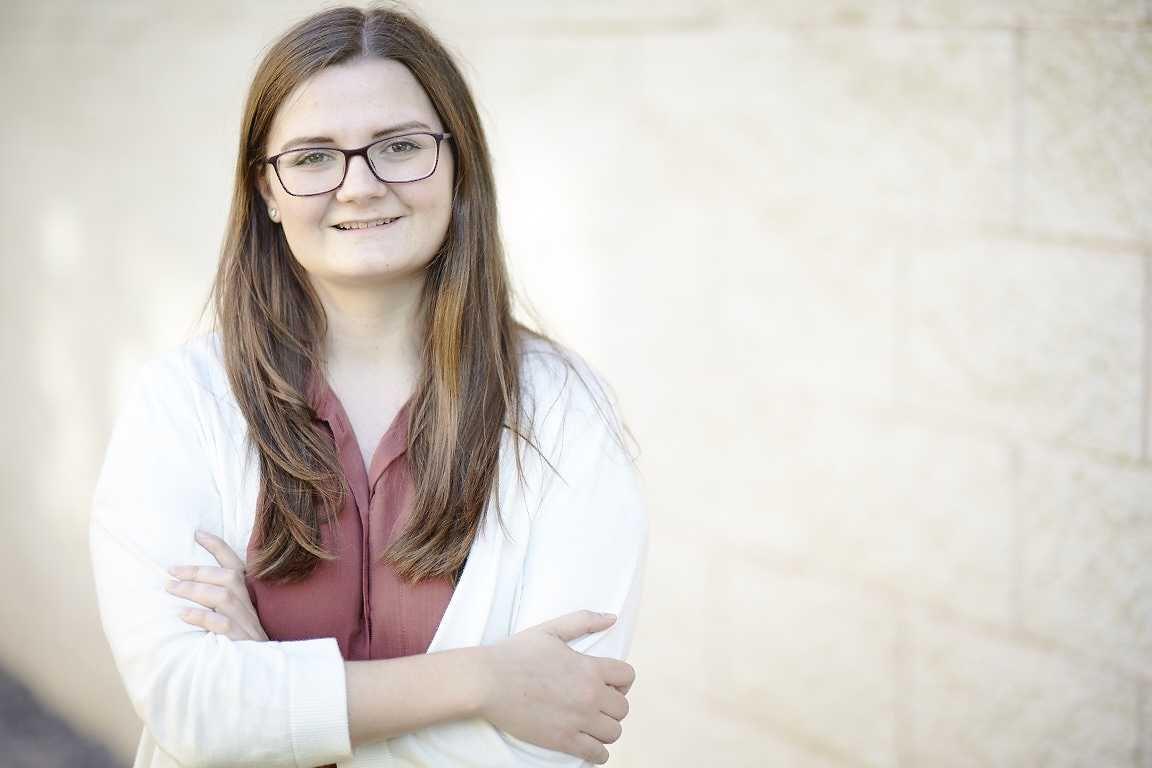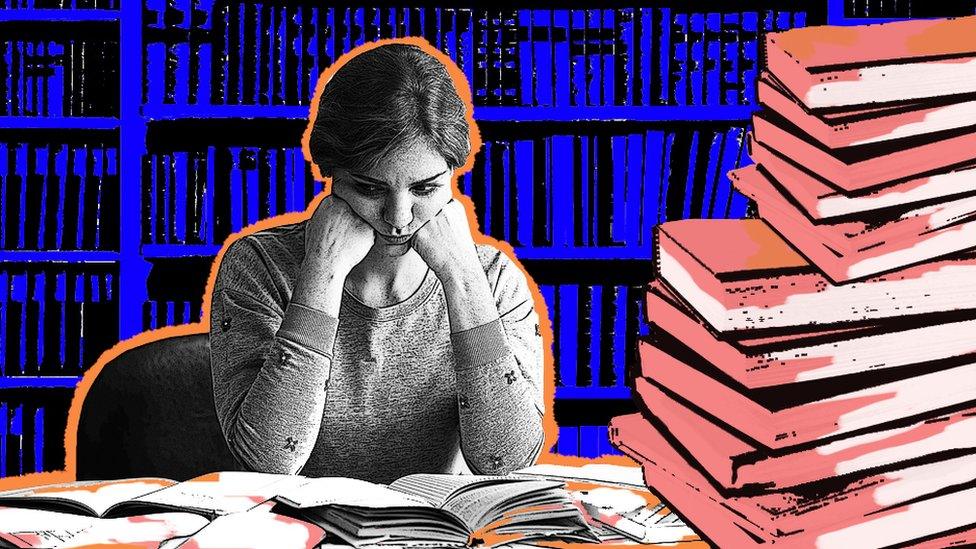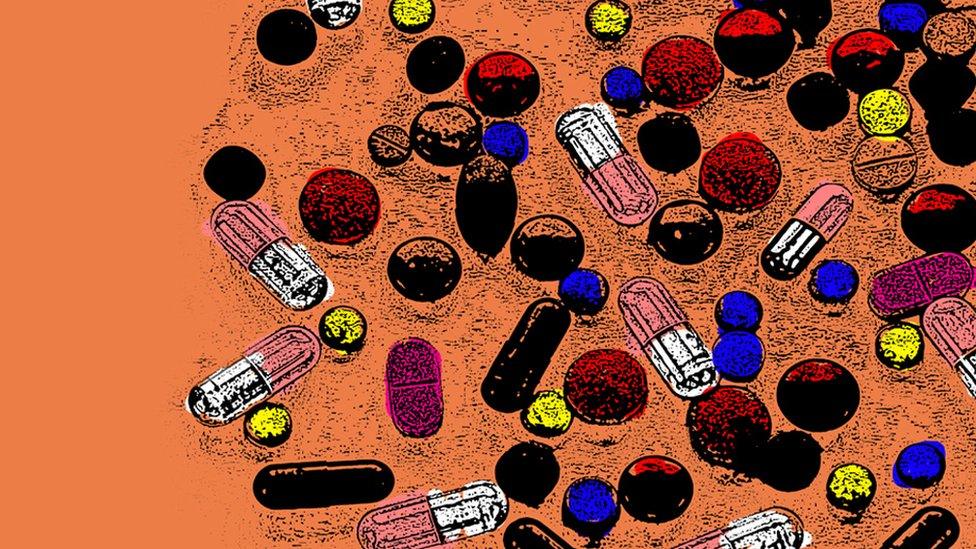'I found a job I love through battling depression'
- Published

Catherine struggled with depression in the second year of her degree in drama and English literature
At her lowest, Catherine wondered whether she would be able to finish her degree.
"I lost all concept of the future. I felt I was losing control of my mind.
'It was my second year at Manchester University, and early on I began feeling very tired.
"Blood tests showed I was anaemic.
"Towards Christmas, I began feeling very anxious and getting quite stressed over my academic work because I couldn't concentrate in the way I was used to being able to.
"I just thought I had low iron and was a bit stressed. I had never thought about mental illness before.
"At home over Christmas, I had more blood tests, which showed I was physically healthy, but I just felt worse. It was more than just low iron.
"I wasn't just feeling tired. It was feelings of worthlessness. I felt there was no point in anything. I just didn't have any hope at all.
"There were points when I was crying or experiencing a numb feeling, just not feeling anything, which was quite scary because I am quite an emotional person."
By February 2016, she was 'just about functioning'.
"The thought of doing anything was overwhelming.
"Even showering, brushing my teeth or cooking felt like a mammoth task.
"Some days getting out of bed was really difficult. Some days I stayed in my room all day. I definitely missed some lectures.

"My attendance dropped, but I didn't completely disappear. I never got chucked off the course. I was still just about functioning.
"But I was panicking and crying, everything was too much. I just didn't know what to do.
"I spoke to a friend about that feeling of hopelessness and just wanting to run away from it all.
"I had never had that feeling before. It was quite scary.
"She pushed me to get treatment."
She was prescribed antidepressants.
"I started a journey that was quite difficult.
"Drugs work differently on different people and the first drug made me worse, mainly mentally.
"I felt I was going downhill.
"It was around that point that I wasn't sure if I could finish my degree."
"Mornings were particularly difficult. I felt I couldn't move.
"The drug was exacerbating what was already there.

"My GP moved me to a different antidepressant, which slowly started to work.
"I was also accessing the university counselling service, which was very helpful.
"And once my academic tutor was aware I was ill, I could go and see her
"I had more relaxed deadlines and access to a study coach, which got set up towards the end of my second year.
"It was a process of getting things in place to make things more manageable."
She also started cognitive behavioural therapy.
"There is a timeliness for different remedies.
"It was the first therapeutic support that was really driving to get you to think about your thoughts and challenge your thoughts. Not all your thoughts are facts."
"If I think about my mind at the time when depression was invading, it was about feeling worthless, and you can challenge those beliefs.
"I think that it's difficult to pin down exactly why or how, but the medication settled and I began to get better.
"I got through the year and gradually became more myself over the summer.
"The third year was all about rebuilding myself.
"When I wasn't feeling good, the future was quite a difficult thing to visualise.
"So the process of applying for a graduate programme was part of starting to believe in myself again and to feel more confident."
In July 2017, she graduated with a first-class degree - and started the training programme a few days later.
"I knew mental health social work was challenging, stimulating and varied and I really wanted to do it.
"I think that contributed to my motivation to work hard in my third year at finding what would help me stay well myself.
"I just knew I needed to develop the resilience and coping strategies that would help me stay well and do the programme and become a mental-health social worker.
"It's been really good. It's very intense, as I expected, and I am learning a lot very quickly. It's a lot to take in.
"There's so much variety in what we are doing. I really enjoy it.
"It's really pushing me and challenging me, but there's a lot of support which has really helped me make the most of it and cope with the challenge and pressure of it.
"I always say that I can't regret what happened.
"It totally changed my plan, and I wouldn't be doing what I'm doing now without that experience.
"I knew I wanted to work with people and had thought about social work generally.
"The experience I had gave me a tiny glimpse into what it means to be mentally distressed.
"It unlocked a level of empathy that I didn't have access to before.
"For me, the thought that I could play a part in someone else's journey is really important to me. It's very rewarding.
"It's connecting and wanting to be part of enabling someone to help themselves and feel well again.
"I am just starting to get my own caseload. Until now, it's been a process of shadowing.
"With close support, I am starting to do some real work. It's exciting."
Catherine is on the Think Ahead, external fast-track training programme and will qualify as a mental-health social worker next year, with a master's degree in social work after two years.
Produced by Judith Burns, BBC family and education reporter.